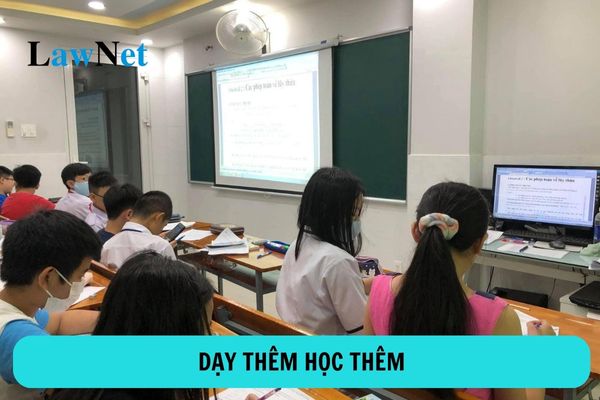Proposal: Not using questions or exercises that have been taught in extra classes to assess and evaluate students in Vietnam
Proposal: Not using questions or exercises that have been taught in extra classes to assess and evaluate students in Vietnam
According to Article 3 of the Draft Circular on extra teaching and extra learning regulations, the principles for extra teaching and extra learning are specified as follows:
Principles for Extra Teaching and Extra Learning
- Extra teaching and extra learning shall only be organized when students have the need for extra learning, voluntarily participate, and with the consent of parents or guardians (hereinafter collectively referred to as parents). Organizations or individuals conducting extra teaching and extra learning activities shall not employ any form to coerce students into extra learning.
- The content of extra teaching and extra learning must contribute to consolidating and enhancing the knowledge, skills, and character of students; shall not contravene the laws of Vietnam, nor carry prejudices related to ethnicity, religion, occupation, gender, social status, customs, and traditions of Vietnam.
- The duration, time, and venue for extra teaching and extra learning must be suitable for the psychological and physical development of the age group, ensure students' health, and comply with legal regulations on security, order, safety, and environmental hygiene in the area of extra classes.
- Shall not reduce the content of school curriculum to incorporate it into extra learning; shall not teach ahead of the curriculum outlined in the school's educational plan; shall not use examples, questions, exercises from extra classes to evaluate students.
- Shall not organize extra classes within the school for schools already conducting two shifts per day.
The Draft Circular on extra teaching and extra learning proposes prohibiting the use of examples, questions, exercises from extra classes to evaluate students. This is one of the notable new points in the Draft Circular on extra teaching and extra learning.
Currently, in Article 3 of Circular 17/2012/TT-BGDDT on principles for extra teaching and extra learning, this issue is not addressed.
View the full text of the Draft Circular on extra teaching and extra learning here: Here

Proposal: Not using questions or exercises that have been taught in extra classes to assess and evaluate students in Vietnam (Image from the Internet)
What are current principles for extra teaching and extra learning in Vietnam?
Based on Article 3 of Circular 17/2012/TT-BGDDT, the principles for extra teaching and extra learning are currently as follows:
- The activities of extra teaching and extra learning must contribute to consolidating, enhancing students' knowledge and skills, educating their character; suited to their psychological and physical characteristics, and not causing an overload for the students.
- The curriculum content of mainstream programs must not be reduced to incorporate into extra learning; extra learning must not precede the contents in the mainstream educational program.
- Extra learning is for students who have the need for extra learning, voluntarily participate, and with the approval of their families; families and students shall not be coerced into extra learning by any means.
- Extra classes shall not be organized based on mainstream classes; students in an extra class must have similar academic levels; placement in extra classes should be based on students' academic performance.
- Organizations or individuals conducting extra teaching and extra learning activities must be responsible for the registered content and obtain permission for the activities.
What are the current regulations on the collection and management of extra class fees in Vietnam?
Based on Clause 2, Article 7 of Circular 17/2012/TT-BGDDT, the regulations on the collection and management of extra class fees currently are as follows:
Collection and Management of Extra Class Fees
- For extra classes conducted within the school:
a) The tuition fees for extra classes are used for remunerating teachers directly conducting extra classes, managing extra teaching and extra learning activities of the school, covering electricity, water expenses, and repairing facilities for extra classes;
b) The rate of tuition fees for extra classes is agreed upon between parents and the school;
c) The school organizes the collection, expenditure, and publicizes the settlement of extra class fees through its financial department; teachers conducting extra classes do not directly collect and handle extra class fees.
- For extra classes conducted outside the school:
a) The rate of tuition fees for extra classes is agreed upon between parents and the organization, individual conducting extra classes;
b) The organization, individual conducting extra classes follow the current regulations on financial management for extra class fees.
Thus, the regulations on the collection and management of extra class fees are as follows:
* Collection and Management of Extra Class Fees within the School:
- The tuition fees for extra classes are used for remunerations for teachers conducting extra classes, managing extra teaching and extra learning activities of the school, covering electricity and water expenses, and repairing facilities for extra classes;
- The rate of tuition fees for extra classes is determined by an agreement between parents and the school;
- Teachers conducting extra classes do not directly collect and handle extra class fees; the school organizes the collection, expenditure, and publicizes the settlement of extra class fees through its financial department.
* Collection and Management of Extra Class Fees outside the School:
- The rate of tuition fees for extra classes is agreed upon between parents and the organization, individual conducting extra classes;
- The organization, individual conducting extra classes follow the current regulations on financial management for extra class fees.

